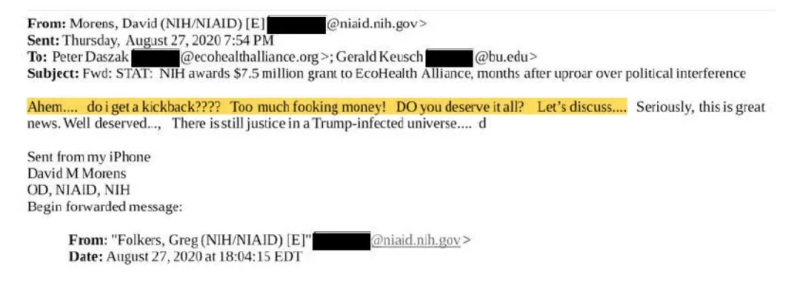
In a moment of rare bipartisan denunciation, Democrat Representative Kweisi Mfume (D-MD) confronted Dr. David Morens, longtime advisor to Dr. Fauci: “Sir, I think you’re going to be haunted by your testimony today.”
Dr. Morens, a senior scientific advisor at the National Institute of Allergy and Infectious Diseases (NIAID), has been embroiled in controversy following revelations of his attempts to seemingly conceal embarrassing information about his personal friend and NIH grant recipient, Dr. Peter Daszak, President of EcoHealth Alliance. Morens’s attempts to evade Freedom of Information Act (FOIA) requests laid bare yesterday in front of the Select Committee on Covid-19 were eye-opening and disturbing.
Dr. Morens frequently used his personal email to conduct official business, explicitly to avoid FOIA scrutiny. He emailed a colleague in May 2020: “So you and Peter and others should be able to email me on gmail only.”

In other uncovered correspondence, Dr. Morens openly discussed methods to delete federal records to prevent their release under FOIA: “I learned from our FOIA lady here how to make emails disappear after I am FOIAed, but before the search starts, so I think we are all safe. Plus I deleted most of those earlier emails after sending them to Gmail.”

In one particularly shocking email, Dr. Morens asked Dr. Peter Daszak for monetary reimbursement—specifically a “kickback”—for his assistance in editing EcoHealth Alliance’s grant compliance efforts. Although this allegation has yet to be confirmed, the email reads: “…do I get a kickback???? Too much fooking money!”

Under testimony, Dr. Morens claimed that this was simply “black humor” and “joking” with his friend Peter Daszak—who is now under disbarment from NIH grants following serious mismanagement of grants to his company EcoHealth Alliance.
In addition to Dr. Morens’s FOIA endrun revelations, the emails also contained unprofessional and misogynistic comments. He seemingly disparaged CDC Director Rochelle Walensky attributing her appointment to her sex: “Well, she does wear a skirt…”
Representative Mary Miller-Meeks (R-IO) confronted Dr. Morens on these issues: “You’re trusted with one of the highest positions in government to combat public health crises. And instead of doing your job, you’re too busy worried about avoiding FOIAs and challenging someone’s position because they happen to wear a skirt.”
Morens apologized but seemed to downplay the significance of his comments: “…it was the same snarky, joking stuff.” But Rep. Miller-Meeks was having none of it. She interrupted: “That’s not a snarky joke. That is an underlying behavior that indicates how you approach women and how you think of women, and it’s disgusting.”
At the heart of the matter is what Dr. Morens was doing to hide information to protect Peter Daszak and even Dr. Fauci from embarrassing revelations of their actions during the Covid-19 pandemic. In emails, Morens discussed back-channeling information to Dr. Fauci to avoid FOIA requests: “I can either send stuff to Tony on his private gmail, or hand it to him…” Confronted by these emails, Morens dismissed them: “There are some elements of this that I don’t think are being understood.”
Additional emails further reveal Fauci’s involvement in offline communications, potentially undermining US government operations by assisting Dr. Morens’s efforts to share internal NIH information with Dr. Peter Daszak.
For instance, Dr. Morens shared confidential information marked (For Official Use Only) with Daszak: “Please feel free to share any docs that I’ve sent to you, with Tony. Hopefully, you can do that in a way that avoids FOIA, and if not possible, just show him stuff on screen share on Zoom.”
Dr. Morens and Dr. Fauci have collaborated and co-authored numerous papers and articles over the years but Morens seemed to downplay his relationship with Dr. Fauci: “I never gone out with him to have a beer.”
Representative Michael Cloud (R-TX) read the email regarding the “FOIA lady” instructing him on how to avoid the information requests. Morens objected: “She gave me [no info] about avoiding FOIA.” Cloud pushed back: “So you were lying then but you’re telling us the truth now?” Morens dug deeper: “I was making a joke with Peter, I said something like ‘I have a way to make it go away’ but that was just a euphemism.”
These past few weeks have been busy for the Select Committee of Covid-19, headed by Rep. Brad Wenstrup (R_OH). They have long requested the disbarment of EcoHealth Alliance and Peter Daszak from the NIH, and the US Department of Health and Human Services (HHS) has initiated formal proceedings. The May 15, 2024 memorandum from HHS underscores the severity of EcoHealth’s compliance failures, emphasizing the need for exacting oversight in public health research.
As background to all of this, the ideological framework that Fauci and Morens have consistently promoted over two decades of co-authorship gives some color commentary on where the stringent pandemic policies originated. Their collaboration began with largely technical papers on infectious diseases, yet over time, their recommendations expanded significantly in ambition.
Their earliest publications together (which started in 2004) seemed to show cautious optimism for tackling infectious diseases without breaching individual rights or governance norms. By 2007, their tone had noticeably shifted. In an article on the 1918 Spanish flu pandemic, they warned against complacency and hinted at the necessity for heightened vigilance.
In their 2012 work, “The Perpetual Challenge of Infectious Diseases,” they moved even further, declaring eradication—rather than just mitigation—as the new goal, emphasizing a radical new approach to managing infectious diseases.
Their evolution was cemented in a 2016 article on the Zika Virus. In it, they posited that human behaviors and modern societal structures were significant contributors to the emergence of diseases.
…in our human-dominated world, urban crowding, constant international travel, and other human behaviors combined with human-caused microperturbations in ecologic balance can cause innumerable slumbering infectious agents to emerge unexpectedly. In response, we clearly need to up our game…
The implications of crowds spreading sickness are not new, but the corollary here is that human actions need strict regulation to prevent future outbreaks, a policy evolution that would have significant impacts just four years down the line.
The culmination of these ideas appeared starkly in their widely-cited 2020 “Cell Magazine” article in the midst of the Covid-19 pandemic. Here, Fauci and Morens argued for transformative changes in human behavior and infrastructure to live “in greater harmony with nature.” They contended that human behaviors fundamentally disrupt the “human-microbial status quo,” leading to disease outbreaks.
This article was a watershed, revealing their vision of a restructured society to prevent pandemics—an ideological stance that has drawn criticism for its potentially authoritarian overtones.
Fauci and Morens’s advocacy for “rebuilding the infrastructures of human existence” was more than a scientific proposal; it was a call for a societal overhaul.
They seem to pine for yesteryear without all the hustling and bustling: “Since we cannot return to ancient times, can we at least use lessons from those times to bend modernity in a safer direction?”
Nothing epitomizes the US Government’s response to the pandemic like the loaded phrase: “bend modernity in a safer direction.”
Now, with Dr. Morens’s skirting FOIA requests and promoting ways to “[make] it all go away” – the hubris is laid bare for all to see.
The deceitful actions of Drs. Morens, Daszak, and Fauci, their evasion of FOIAs, and their backroom dealings have severely undermined public trust. As these revelations come to light, it is crucial for us to demand greater transparency and integrity from our public health officials. Only then can we restore faith in our health institutions and ensure they truly serve the public good.
Republished from the author’s Substack
Disclaimer
Some of the posts we share are controversial and we do not necessarily agree with them in the whole extend. Sometimes we agree with the content or part of it but we do not agree with the narration or language. Nevertheless we find them somehow interesting, valuable and/or informative or we share them, because we strongly believe in freedom of speech, free press and journalism. We strongly encourage you to have a critical approach to all the content, do your own research and analysis to build your own opinion.
We would be glad to have your feedback.
Source: Brownstone Institute Read the original article here: https://brownstone.org/

